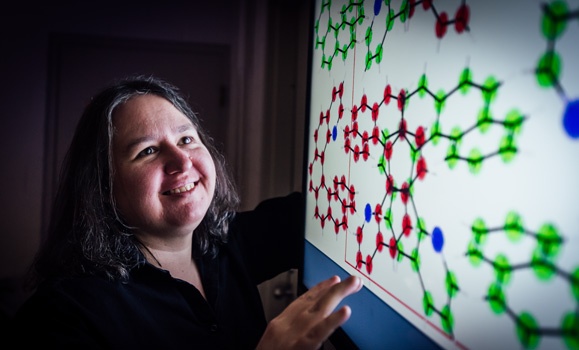A world-leading expert in theoretical chemistry from ║┌┴¤│ď╣¤═°has been honoured by the (RSC) for her outstanding achievements.
Erin Johnson, a professor in DalhousieÔÇÖs Faculty of Science, has received the 2020 . This award was established in 1980 by the Royal Society of Canada in memory of Lord Rutherford of Nelson, a scientist and leader in nuclear research. It is awarded for outstanding research during the formative stage of a career in any branch of chemistry and in recognition of Lord RutherfordÔÇÖs own research carried out in Canada at a relatively young age.
ÔÇťI am deeply honoured to receive the Rutherford Memorial Medal,ÔÇŁ says Dr. Johnson. ÔÇťThe list of previous winners is extremely impressive and I am proud to┬ájoin this distinguished group of researchers. Given some of the┬ástrong recent faculty hires in the Chemistry department, I hope and┬áexpect that there will soon be further Rutherford medalists at┬áDalhousie.ÔÇŁ
A graduate of Carleton University in Ottawa, and QueenÔÇÖs University in Kingston, Dr. Johnson is recognized internationally as a rapidly rising star in theoretical chemistry, where computational tools are used to model chemistry at the atomic level. With possible real-world applications, those computational models are rapidly gaining prominence with possible global benefits, including the design of new drugs, catalysts and materials for energy applications.
'Best young chemist'
Dr. Johnson currently holds the Herzberg-Becke Chair in Theoretical Chemistry, established after ║┌┴¤│ď╣¤═°ÔÇÖs Dr. Axel Becke was awarded NSERCÔÇÖs Gerhard Herzberg Canada Gold Medal for Science and Engineering. She has been referred to as not only the best young theoretical chemist in Canada, but perhaps the ÔÇťbest young chemist (of any kind) in all of North America,ÔÇŁ and has published 122 scientific papers in peer-reviewed journals, which have received over 15,000 citations ÔÇô nearly tenfold what might be expected for someone at this stage of their career.
ÔÇťCongratulations to Dr. Johnson on this well-deserved recognition from the Royal Society of Canada,ÔÇŁ says Alice Aiken, vice-president research and innovation at Dalhousie. ÔÇťSince arriving at Dalhousie, she has demonstrated unflagging scientific leadership, with astounding accomplishments to date. She is determined, dedicated and diligent, and is clearly having an exceptional impact on her field.ÔÇŁ
No stranger to accolades, Dr. Johnson received the 2018 Tom Ziegler Award from the Canadian Society for Chemistry, the 2017-18 Faculty of Science Killam Prize from ║┌┴¤│ď╣¤═°and the 2016 CMOA Promising Scientist Award from the Centre for Applied Wave Mechanics.
Most notably, in 2018 she became only the second Canadian to receive the Dirac Medal. This is presented each year by the World Association of Theoretical and Computational Chemists to one outstanding theoretical and computational chemist under the age of 40.
She is also one of six recipients of the 2019 NSERC E.W.R. Steacie Memorial Fellowships, which are awarded annually to enhance the career development of outstanding and highly promising scientists and engineers who are faculty members of Canadian universities. These are CanadaÔÇÖs most prestigious national awards for early-career researchers across all science and engineering disciplines.
Read: Rewarding Promise ÔÇô Dal Chemistry Prof Receives E.W.R Steacie Memorial Fellowship
A first for Dal
It is the first time ever that a researcher from ║┌┴¤│ď╣¤═°is the recipient of the Rutherford Memorial Medal in Chemistry. Dr. Johnson will receive her award in November, during the Royal Society of Canada Celebration of Excellence and Engagement, which will be hosted by the University of Toronto.
Founded in 1882, the Royal Society of Canada is comprised of established leaders across the Academies of Arts, Humanities and Sciences and well as emerging leaders in the College of New Scholars, Artists and Scientists. The objective of the RSC is to serve Canada and the world by recognizing CanadaÔÇÖs leading scientists, scholars, and artists and mobilizing them in an open discussion to advance knowledge and understanding of critical issues with a view toward contributing to a better future.
For more information, visit the Royal Society of Canada .

